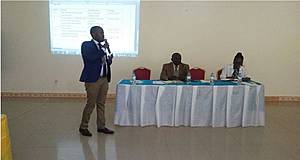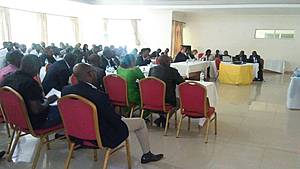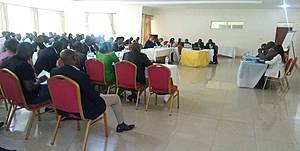Minister of Trade, Industry and East African Community Affairs Cautions Stakeholders in Meat Value Chain over Compliance with HACCP Requirement
Within the framework of ensuring safe food along the meat supply and value chain, the Ministry of Trade, Industry and East African Community Affairs (MINEACOM), Rwanda Standards Board (RSB) and with the support of Rwanda Development Board (RDB) are conducting three-phased training on Hazard Analysis and Critical Control Point (HACCP) and other relevant standards on meat processing and handling.
The training sees participation of companies and people active in the meat value chain around the country coined as “from farm- to- folk” that is farmers, processing and handling businesses including abbatoirs and meat processing and trading units. The first phase of that training was implemented from 23rd up to 28 January 2017; and the second phase was conducted from20th-24th February, 2017.
 Director General of RSB delivering his welcome remarks
Director General of RSB delivering his welcome remarksHon. Minister of Trade, Industry and East African Community Affairs met participants, on 22nd January, 2017 and cautioned them over malpractices along the meat value chain. On the welcome note, Mr. Raymond Murenzi, Director General of Rwanda Standards Board highlighted the progress of the HACCP training, contents covered in the first and second phases. He also informed the Minister that it is expected that upon completion of the three phases the 22 companies trained will be able to apply for HACCP certification, a big achievement towards ensuring meat safety and strong foundation of the sector competitiveness.
In his remarks, Hon. François Kanimba commended the efforts to standardize the meat sector: “implementing HACCP in meat processing and growing that business in Rwanda is crucial nowadays. Making meat business competitive is coupled with adding values to hides and skins for the national economic growth.
“Seeing cattle and sheep crossing our borders to other countries should stop. We are committed to improving and adding value to the meat business in the country. It is time not only to publish good reports on livestock and farming practices, rather set up policies to add value to the business meat business and make it a reliable contributor in the economic development. People doing meat business in Rwanda need to comply with HACCP and avoid importing meat from other countries. The Rwandan meat market is open for everyone but that will be possible for those complying with needed requirements in the standard. There are many clients such as airline agencies, hotels and other meat product selling establishments but they need to get meat that complies with HACCP requirement”.

Participants following Minister of Trade, Industry and East Africa Community Affairs, Hon. Francois KANIMBA’s remarks .
During plenary sessions, it was requested to establish the Rwanda National Meat Platform, as platforms are available for other products in agricultural business. This platform will be composed of the farmers as primary producers, government representatives, abattoirs owners, people in cow business, big meat clients like hotels and airline agencies.

Participants were here sharing their ideas during the meeting
In order to ensure food safety across the food value chain, standards have been developed and participants are being trained on relevant standards including: RS 185: 2013; Code of Hygienic Practice for Meat, RS 184: 2013; Hazard Analysis and Critical Control Points, RS 201: 2013; Abattoir — Basic requirements, RS ISO 19011: 2011; Guidelines for auditing management systems, and RS ISO/TS 22002-1: 2009; Prerequisite programmes on food safety — Part 1: Food manufacturing.
Rwanda Standards Board (RSB), will continue to assist different stakeholders through trainings and workshops to assure the awareness of HACCP and its implementation.